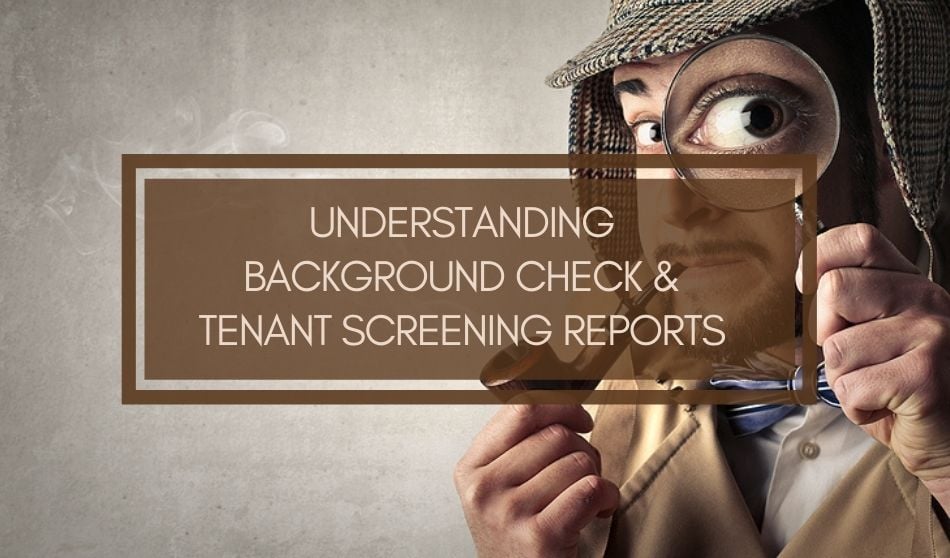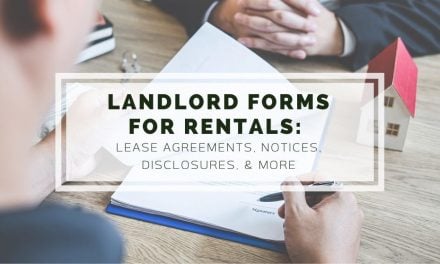
One of the most challenging aspects of landlording is choosing the right tenant. Fortunately, there are resources available by conducting a background check in the tenant screening process. Those records can not only confirm the application and interview specifics but could reveal undeclared details if you know how to decode that data.
What Does a Background Check Show
What shows up on a background check depends on the type of reports pulled. Some of the most important and common reports include:
Nationwide Criminal Report
This type of database search provides criminal history including felony and misdemeanor records, sex-offender records, and inmate records.
Nationwide Eviction Reports
The information provided on these reports is determined by the county that submits the reports to the national database.
Social Security Number Validation
This report includes the issuing state and date when applicable and will verify the SSN is not registered to a deceased individual.
Address Verification
Sometimes bundled with the SSN verification report, the prior address history report includes the name registered to the SSN entered, age and date of birth registered to the SSN, all prior addresses associated with SSN, and dates registered at those addresses.
Credit Reports
Depending on the provider, credit reports will indicate the applicant’s FICO® Credit Score, payment history, payment patterns, tax liens, bankruptcies, judgments, collection accounts, and SSN and address and employment information.
Understanding Nationwide Tenant Screening Reports
Unlike credit reports that are specific to the social security number, other tenant screening reports are indexed by different data points such as name, date of birth, and address. It will pull all persons with the same or similar data points across the country. Because of this, a criminal report can provide similar matches as well as false positives.
President of Rentec Direct, Nathan Miller offers this helpful advice when trying to understand nationwide criminal reports,
“Verify identity. Once you’ve ordered a report, you might get results that do not belong to your applicant. That’s because somebody with the same name (or alias) was convicted and the report is including it. Because convictions are indexed by name and date of birth, there’s no way a screening vendor can eliminate these from the list, so it is up to you to review it carefully. A neat trick I’ve learned is to review the convictions that do not include a picture and compare them to their address history report to see if they lived in the area of the conviction at any point of their lives.”
When these types of reports provide information that matches or closely matches the applicant’s name, date of birth, or location and it would be up to each landlord to compare that report with their applicant to verify if it is a match.
Because the information in the national database is provided by the state, county, or other municipalities or agencies where the event took place, either due to error or omission some reports may return a false negative. If you suspect this is the case, county and state-wide reports are available that might be a good option.
Deeper Dive
The Ultimate Guide to Tenant Screening for Landlords
Understanding Criminal Reports
Understanding Nationwide Reports
Understanding Credit Reports
How to read a credit report is simple as the information uniquely matches the social security number of an applicant. As there is no need to decipher the information because it belongs to your applicant, you can begin straightaway comparing the credit report to their financial documents and rental application answers.
Many landlords use this and bank statements to calculate the debt to income ratio of an applicant as well as confirm their credit FICO® Credit Score is in line with their rental criteria. If you’ve never seen a credit report, examples of a credit report card and full credit report are available to view here: Understanding Credit Reports
Rental criteria is state-specific so be sure to check out your local regulations regarding income sources, credit score minimums, and other financial rental criteria.
New Landlord Frequently Asked Questions about Background Check and Tenant Screening
- How do you know which tenant screening is best? With so many options available, it gets tricky weeding through tenant screening providers. Because each provider, database, and report are different, to understand how providers and reports differ, you won’t regret the few minutes you spend on this must-read by our own Nathan Miller. His article outlines what to know and look out for when choosing a provider, understanding the different credit bureaus, how the nationwide criminal and eviction databases pull and display data, and much more.
Are All Tenant Screening Reports Created Equal?
- How to do a background check? The three main ways to get access to those reports are either to use a property management software with built-in tenant screening options, use a stand-alone tenant screening product, or direct your prospective tenants to a renter-paid screening program where they initiate and pay for the reports that are then emailed to you.
- Do I need to use a background check authorization form? Always and absolutely. It can be a separate authorization form or included in your rental application. Either way, to protect yourself from legal issues and to comply with tenant screening regulations, be sure to obtain authorization. Quick note: many property management software programs offer online applications. A good landlord software that offers this feature will have the authorization built-in to the application process.
- How long does a background check take? Some providers deliver report packages within 60 seconds while others can take 30 minutes up to 3 days depending on how quickly the tenant can verify their identity when involved in the order process.
- Are tenant screening reports expensive? Packages can range from $15 to upwards of $45 or more depending on the tenant screening provider.
- Do I need to do an advanced background check? That depends on your business needs and if you believe you need further details about your applicant. Mostly likely, these will be ala-cart options and not included in standard screening packages. Some advanced background check reports include: Pet screening, bankruptcy, judgments, and liens, income verification, and state or county-specific criminal reports.
- What is a background check and why are they important? It’s all about fact-checking. In the tenant screening process, an interview is conducted, the application is verified, and a background check is performed. These background checks are outside verifications and data derived from third parties. Some landlords assume that with great interview skills and a few phone calls they can choose a good renter by gut instinct. Relying solely on the rental application documentation and good interview skills is like trying to navigate a journey with only a partial map. Maybe that doesn’t impact you in the moment, but down the road, it can catch up to you and leave you completely lost.
Reports can be pulled, references contacted, financial statements reviewed, and more during a background check. It provides a key to understanding and validating the information the prospective tenant offered in the interview, rental application, and supporting documents and uncovers any missing details. The complete tenant screening process helps you make the best decision for your business, assets, and community.






Very handy!
Thank you — so glad you found it helpful.